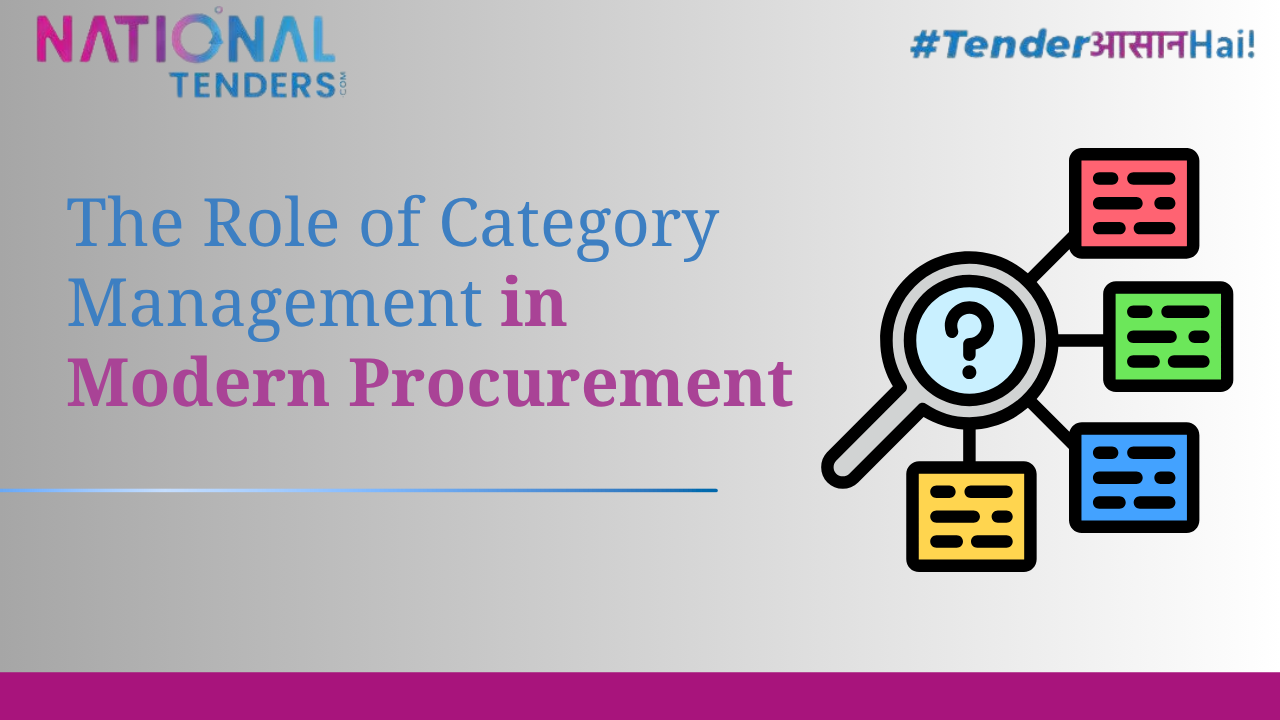- Home
- >
- Blog
OUR BLOG
A collection of stories about our people, our capabilities, our research, and the ever-changing face of our firm.

NationalTender
The Role of Category Management in Modern Procurement | 30 May, 2025
The Role of Category Management in Modern Procurement
Ever wondered how leading organizations consistently win tenders, cut costs, and build powerful supplier partnerships? The secret isn’t just in negotiation—it’s in mastering category management. In the fast-paced world of tenders and public procurement, category management is the backbone of smarter, more strategic buying.
What Is Category Management in Procurement?
Category management is a strategic approach that organizes purchasing activities around specific product or service categories, rather than treating every purchase as a one-off transaction. Instead of buying office supplies, IT hardware, or construction material separately, companies group similar spend areas into categories and manage each as a distinct business unit.
Category Examples
Why Category Management Matters in Modern Procurement
1. Smarter Spend Data Consolidation
By consolidating spend data across categories, procurement teams gain clear insights into where money goes. This makes analyzing, tracking, and reporting expenditures easier, unlocking actionable insights for better tender decisions and spend control.
2. Cost Savings and Value Creation
Category managers leverage deep market knowledge and bulk buying to negotiate better prices, secure volume discounts, and reduce redundant spending. This approach helps organizations achieve significant cost savings across government, PSU, and MSME tenders.
| Benefit | How Category Management Delivers |
|---|---|
| Increased Savings | Bulk buying, long-term supplier partnerships |
| Strategic Sourcing | Better supplier selection and contract terms |
| Reduced Redundancies | Streamlined processes, fewer duplicate purchases |
3. Enhanced Supplier Relationships and Innovation
Managing categories enables stronger, more collaborative supplier relationships. Long-term contracts, joint innovation, and continuous improvement lead to better quality, reliability, and service.
4. Risk Reduction and Compliance
Category management helps organizations proactively mitigate risks such as supplier dependency, market volatility, or regulatory changes. This is particularly crucial for sensitive areas like defense, healthcare, and infrastructure tenders.
5. Better Alignment with Business Goals
Category management ensures procurement is a value-adding function aligned with organizational objectives. It transforms procurement from a cost center to a strategic partner in growth, innovation, and sustainability.
The Four Pillars of Category Management
| Pillar | What It Means |
|---|---|
| Planning | Define strategy and categories, gather spend data, set goals |
| Procurement | Strategic sourcing, supplier selection, negotiation |
| Performance | Track KPIs, monitor supplier performance, drive improvement |
| Promotion | Foster supplier relationships and encourage innovation |
Steps to Implement Category Management
1. Prepare and Gather Information
- Identify spend categories and subcategories based on business needs
- Collect supplier performance data, historical spend, and market trends
2. Conduct Spend and Market Analysis
- Analyze spend in each category to identify savings opportunities.
- Research market trends, supplier capabilities, and pricing benchmarks.
3. Develop Category Strategies
- Prioritize categories based on spend, risk, and business impact.
- Create sourcing strategies to maximize value and minimize risk.
4. Build Supplier Relationships
- Negotiate contracts with clear performance metrics and incentives for innovation.
- Onboard and evaluate suppliers for long-term partnerships.
5. Monitor Performance and Drive Improvement
- Use digital dashboards to track KPIs and supplier performance.
- Continuously refine strategies based on data and feedback.
| Step | Key Actions |
|---|---|
| Category Identification | Analyze spend, define categories |
| Market Research | Study trends, benchmark suppliers |
| Strategy Development | Set goals, plan sourcing and negotiation |
| Supplier Engagement | Negotiate, onboard, and manage relationships |
| Performance Management | Track KPIs, review, and improve |
Real-World Impact: Category Management in Action
Organizations using category management have reported:
- 15% reduction in procurement costs
- 30% faster tender cycle times
- Stronger supplier collaboration and innovation
- Lower supply chain risk and improved compliance
From central government tenders to niche opportunities like renewable energy and smart city projects, category management delivers measurable benefits across the board.
Best Practices for Category Management Success
- Leverage Data Analytics: Use real-time spend and supplier data for informed decisions.
- Promote Cross-Functional Collaboration: Involve stakeholders from finance, operations, and business units.
- Invest in Expertise: Appoint skilled category managers with deep market knowledge.
- Adopt Digital Tools: Use platforms for spend analysis, supplier tracking, and tender management.
- Align with Business Goals: Ensure category goals support overall business strategy.
The National Tenders Advantage
Category management can seem overwhelming with the complexities of live tenders, compliance, and vendor management. National Tenders simplifies the process for you:
- Expert guidance for category strategy and digital procurement.
- Tender notification services and real-time updates across sectors.
- Support for bid submission, vendor registration, and compliance.
- Tailored consultancy for government tenders, e-procurement, and niche projects.
Conclusion: Category Management Is the Future of Procurement
In the competitive world of tenders, category management is your key to smarter spending, stronger supplier partnerships, and sustainable growth. It’s not just about winning tenders—it’s about delivering unmatched value, innovation, and resilience.
Ready to elevate your procurement game? Let National Tenders be your partner in transforming your strategy with category management. Contact us today and unlock the power of smarter procurement!
 How E-Tendering is Transforming the Tender System in India
How E-Tendering is Transforming the Tender System in India Building Strong Vendor Partnerships in the Tender Ecosystem
Building Strong Vendor Partnerships in the Tender Ecosystem Unlocking Big Savings Through Smart Tender Strategies
Unlocking Big Savings Through Smart Tender Strategies How Generative AI Is Disrupting Tendering in 2025
How Generative AI Is Disrupting Tendering in 2025 Risk Management in Tender Procurement: A Modern Guide
Risk Management in Tender Procurement: A Modern Guide
SUBSCRIBE NOW
Kindly fill up the form